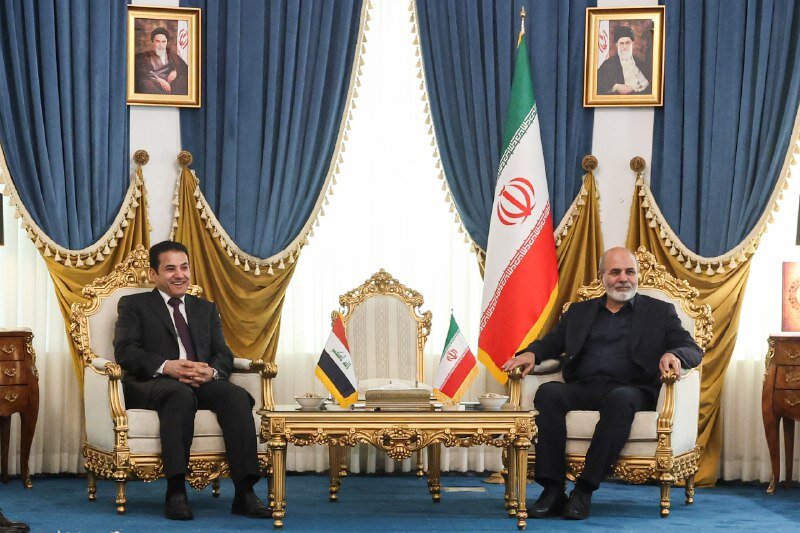Iran calls on Iraq to fully implement security pact

TEHRAN – The top security officials of Iran and Iraq met in Tehran on Sunday to exchange views on mutual issues, including how to fully implement the March security agreement between the two neighboring countries.
Ali Akbar Ahmadian, the secretary of Iran’s Supreme National Security Council (SNSC), said the security agreement will guarantee security in border areas and called it a “proper and reasonable roadmap” in the face of security problems. He also insisted that “it must be implemented precisely and fully”.
Based on the security agreement, Iraq must purge the northwestern borders with Iran from militant separatist Kurdish groups that commit acts of terror in the border areas.
Of note, Iran and Iraq inked the security agreement in March in a bid to secure the joint border and remove the separatist groups from the Iran border with Iraqi Kurdistan. Under this deal, Iran demanded the expulsion and disarmament of the separatist groups, which the Iraqi federal and regional authorities appear to have done partially.
Earlier, Iran set a deadline for Iraq to disarm and relocate the Kurdish militant groups. The deadline came to an end on September 19, with Iraqi federal and regional authorities scrambling to implement the security agreement.
In the lead-up to the deadline, several Iranian officials announced that the deadline wouldn’t be extended, signaling that military action would follow if Iran’s demands were not met.
According to the statements by political and security officials in Baghdad and the autonomous Iraqi Kurdistan region, these militant groups have been relocated to camps inside Iraq far away from the border with Iran.
These militant groups were using the Iraqi Kurdistan region for hit-and-run operations on Iran’s border with Iraqi Kurdistan.
Iraq’s National Security Advisor Qassim al-Araji also said Iraq is serious about implementing the security agreement between the two countries.
Al-Araji is accompanied by an Iraqi delegation, including Kurdistan Regional Government (KRG) Minister of Interior Reber Ahmed.
Iraqi Prime Minister and Commander-in-Chief Mohammed Shia’ Al-Sudani has called for the meeting in order to follow up on the security agreement between the two sides that aims to expel the Iranian-Kurdish militant forces from the country’s borders, a statement from the advisory read, Kurdistan 24 reported.
Iraq’s top security officials have conducted several visits to the Kurdistan region for the same purpose, Kurdistan 24 reported.
The United Nations has also been part of the discussions.
Iran has previously bombarded the border areas and positions of the militant groups.
According to Kurdistan 24, Kurdistan Region officials have said on many occasions that they do not allow any group to threaten Iranian national security from within the Kurdish region.
Should the Iraqi government fail to move the forces away from the border by Sept. 19, Tehran has forewarned it would resume its drone and artillery shelling against the positions of the Kurdish forces inside the Kurdistan region, which had witnessed rounds of attacks last year.
With the security agreement implemented to a large extent, Iran and Iraq appear to be heading toward an era of sustainable security, which is expected to pave the way for further economic benefits for Iran, Iraq, and the Iraqi Kurdistan region. The presence of Kurdish militant groups had been a major obstacle to such benefits. But now with the security situation stabilized in the Iraqi-Iraq border, new horizons for economic prosperity could be opened for both countries.
Iran’s security chief calls for tapping potential in Tehran-Baghdad ties
Ahmadian also pointed to various agreements between the two countries, especially in economic areas, saying, “There are abundant capacities to promote inclusive ties between two countries in different sectors and this entails great efforts to materialize them.”
For his part, Al-Araji said, “We will welcome and use any opportunity for developing and deepening Baghdad-Tehran ties.”
Ahmadian also thanked the Iraqi government for organizing the “magnificent” Arbaeen rituals as well as the hospitality of the Iraqi people toward Iranian pilgrims.
Iran’s security chief also pointed to the political and cultural aspects of the Arabeen rituals, saying they have solidified amity between the Shias in Iran and Iraq.
This year more than 3 million Iranians visited Iraq to mark Arbaeen.
